As I’ve previously stated: “If I could travel into the future, my first port of call would be where medical technology is at its best because, like most people on this planet, I have this aversion to dying.”
Immortality is a constant theme in SF, but what style of immortality? Throughout SF you can see appeals to some power to this end. They extend from those with a religious and supernatural basis to the scientific. That appeal has always existed because we do and always have had this “aversion to dying.” Arguably it is the driver behind belief in the supernatural. Arguably it is behind the “scientific belief” in the AI singularity often been labelled “the Rapture of Nerds.”
In Philip Jose Farmer’s Riverworld we are resurrected to eternal life in new bodies on a world covered with a giant river valley. We awake on the banks of this river in perfect 25-year-old bodies, which can regenerate from just about any injury, and remain at that age forever. No severed limbs, no wheelchairs, sight restored if lost, no tooth decay. Provision is even made for those who died young. They are resurrected at the age they died, grow to 25-year-olds and so remain. This is a direct translation of religion into an sfnal setting, and its source is hinted at all through. The resurrected get their sustenance from “Grails,” while one wonders why all the men are reborn without foreskins. The heavenly host, the alien Wathans, created the place for “moral contemplation” where humans can lose their barbarity in preparation for moving on. But still, that contemplation involves numerous adventures with historical figures—the explorer Sir Richard Burton is a main character—and the books are an enjoyable ride.
Buy the Book
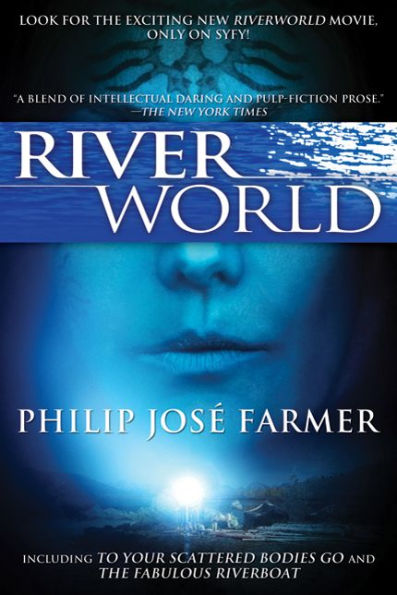

Riverworld
Mind of my Mind by Octavia Butler describes an immortal telepath called Doro, who can transfer himself from body to body. Throughout his long life he has been running a breeding program to create more telepaths—a uniquely powerful group of humans. This is a bleak tale with a nasty, murderous villain in the form of Doro, that explores the “super-human.” But it is also a reflection of another well-known tale. An ancient immortal who kills to continue living while raising up lesser versions of himself? Subjugating and controlling those around him? Mind of my Mind is Dracula with a large sfnal twist, excellently done of course, but still lingering in the realm of the supernatural.
Buy the Book
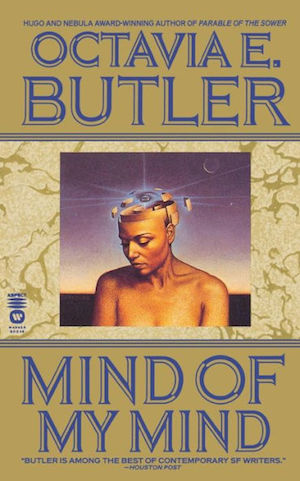

Mind of My Mind
The immortality in Healer by F. Paul Wilson is via a parasitic alien that drops on the protagonist in a cave and alters his body so it will not die. The Healer is able to cure people with a laying on of hands that seems straight out of the Bible, but has strayed out of the realm of the supernatural and into that of parasite biology. Parasites can do a lot to their hosts and usually it is unpleasant. They can even control a host’s mind—usually to make it more available as food for said parasite’s next host. But while occupying a body, it does not want to be eaten by anything but its next host. There is one that occupies a snail, for example, and causes it to grow a more protective shell. It is not a stretch to imagine extended life resulting from parasitism because there is biological reasoning behind it. I do this myself in The Skinner whereby humans are transformed into tough immortals by a virus imparted by the bite of a leech. Those humans become an undying reusable food source for the leeches, which makes sense in the utterly pragmatic and ruthless natural world.
Buy the Book
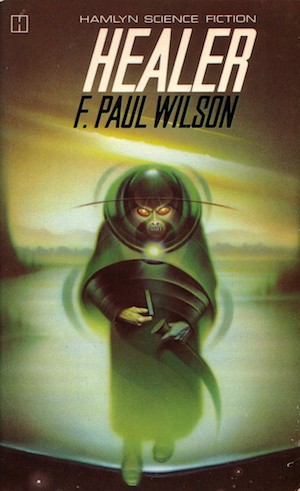

Healer
A further biological twist arises in Protector by Larry Niven. We were never meant to die because we are of another race, the Pak, but missing an essential food item that switches us to a stage of immortal existence. All the negative characteristics of aging are in fact the failure of a breeder (one of us) to turn into the super strong and intelligent fighting machine that is a Protector: the toughening skin, enlarged joints, loss of our teeth, dietary changes. There are also links here to the “grandmother hypothesis”—we live long after ceasing to breed because as caregivers to our grandchildren we ensure our genes are passed on. This book follows a biological logic with a large injection of imagination. It’s a virus in the roots of the “tree of life” (bit like a sweet potato) that causes this transformation. The story itself concerns the journey of a Pak to a lost colony of breeders and what ensues when he arrives. That colony is Earth and we are those breeders.
Buy the Book
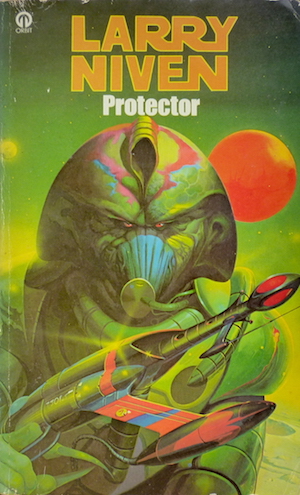

Protector
Finally, we have the contemporary Altered Carbon by Richard Morgan. Like computer programs we can be recorded to cortical stacks planted in our skulls. From these we can be downloaded to new bodies, or “sleeves.” The idea that we can go into computer storage is much in vogue in SF now because in the computer age everything can be stored digitally, while we are mapping the mind and making digital interfaces with it. I could have chosen any of a number of books (including my own) to illustrate this but I selected Altered Carbon simply because it is a honking good read and a blast. Interestingly, even here, ideas of Heaven and Hell arise. Humans can live endlessly in virtual worlds, though in this dystopia they are mainly tortured endlessly in virtual hells. And the “sleeves”? Why not in this age when we are 3D printing organs?
However, this is the best version of immortality we have in SF now. Who knows what’s round the corner?
Buy the Book
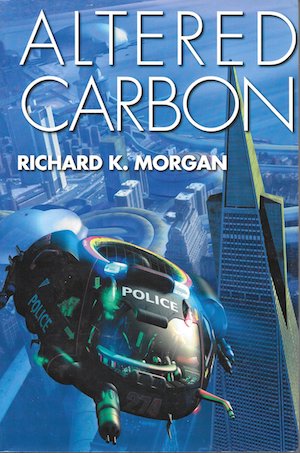

Altered Carbon
Originally published April 2017.
Neal Asher lives sometimes in England, sometimes in Crete and mostly at a keyboard. He’s had twenty-three books published and can now call himself an author without cringing. He’s also read more SF than some would style as healthy. The Warship, book two in his Rise of the Jain series, publishes November 2019 with Night Shade. Find him online at his blog, or on Twitter @nealasher.










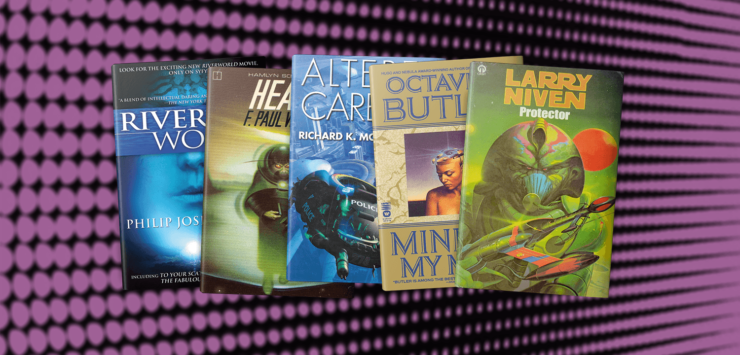
Its not exactly the same, but I loved Sanderson’s first novel, Elantris, for its unique perspective on what it might look like to be immortal and undying. I’ll say no more here, because spoilers, but it worked for me.
The pedant in me has to acknowledge that its not totally unique, but I’d say that it is unusual and that his book covers it very well and is the most popular volume to do so.
It’s worth noting that the even in Niven’s novels, humans are still “meant” to die. Only a rare few would ever undergo the transition to Pak Protector.
And since the original Pak were utterly dominated by their biological programming, becoming utterly and insanely devoted to protecting the breeder humans, arguably becoming one was a fate worse than death. (Later stories in the same universe but not by Niven himself are slightly less bleak, as Earth humans have evolved without the Pak ruthlessly culling any mutations and so Pak derived from their stock are more flexible. But the species was still designed as a weapon of war.)
Heinlein’s Time Enough for Love is on point, with continual rejuvenation technology (assuming you lived long enough for the tech to be invented)
Tad Williams’ Otherland series is about a group of billionaires building a hyper-realistic online simulation and copying their consciousness into an avatar of themselves. They have to kill themselves at the same time as their brain is copied into the simulation. That never really made sense to me as form of immortality because the real you still dies. So if you’re looking to completely avoid death, that’s not exactly the best plan.
don’t forget neal stephenson’s recent: fall, or dodge in hell!
the fountain of books
Poul Anderson’s Boat of a Million Years has the rare human sport born immortal. But they get to watch their children live normal lifespans and die.
Anderson does his usual excellent job of depicting the historical settings characters are born in, or live through. This is one of Poul’s better efforts—which says a lot.
Scalzi’s “Old Man’s War” series has functional immortality. Not sure if he actually does anything with it though.
Alan Cole and Chris Bunch’s Eternal Emperor made himself ‘immortal’ through brain copying and clones. Until the copying facility was damaged and the next clone came out almost, but not quite sane. Cue up some Interesting Times for our formerly loyal protagonist. The full extent of the Emperor’s plot isn’t revealed until the last book in the series.
Fernhunter @@@@@ 7,
I don’t think I’ve ever been so disappointed by the last part of a book as I was with Boat of a Million Years.
But then, this may well be because I had been so enthralled by the concept and how the earlier chapters had handled it (the ones taking us up to about 1900).
(Plus I think it would make a great TV Series.)
The one i first recalled was The Postmortal by Drew Magary. Maybe not a classic, but a very good depiction of a world where you don’t get an immortal life of leisure, you get a life with no retirement and limited world resources in a never shrinking population.
Who can forget Cory Doctorow’s Down and Out in the Magic Kingdom? I’ve always seen it as a nightmarish dystopia, but I suspect it’s meant to be somewhat ambiguous. At the very least immortality isn’t an unalloyed good.
Kate Wilhelm’s Welcome, Chaos has an interesting take on immortality, where the treatment kills half of those who take it and those who survive are sterile.
I also liked Sharon Webb’s Earth Child trilogy, where the immortality treatment kills any creativity in the recipients.
In Joyleg, a 1962 folly by Ward Moore and Avram Davidson, Congress discovers a still-living veteran of the American Revolution. Isachar Joyleg served as a Marine. He was stationed on the Bonny Dick under Captain Jones. Better known as the Bonhomme Richard and John Paul Jones. Joyleg was a light satire. But it was entertaining and well researched; as you could guess from the two authors.
Joyleg has survived the centuries by bathing in moonshine made from a certain spring in his isolated home village, Rabbit Notch. In practice he trades long life for sterility.
I never understood why they didn’t republish Joyleg in 1976, for America’s 200th anniversary.
Being a Doctor who fan, my first thought was of course Captain Jack, and especially Miracle day, though of course the whoniverse dealt with immortality long before that (the five doctors).
Two recent favourite instances though I can think of, are bitter angels by C L Anderson, aka Sarah Zetel and April fools day forever by KAte Wilhelm which both did some really interesting things with immortality.
Kate Wilhelm imagined a medical conspiracy where a lot of the world’s doctors had discovered an immortality drug and were secretly distributing it to friends and colleagues. Only problem? Without any death, people lose a basic link to humanity, call it the Jungian unconscious or a link to Gaya, or just an uncoupling from biology. Welhelm leaves the actual identity of what is lost up to the reader, but its unquestionably missing.
This doesn’t however do what you expect, people don’t become psychotic or evil or mean, they just become apathetic, since with no basic links to life, they cannot appreciate art or beauty or even feel more than vague familiarity or fondness for anything, or anyone and are actually objects of pity rather than env.
Bitter Angels deals with much more positive immortality, but with some very interesting implications, for example, people do not have one family, but successive families, since spending more than about 50 years with someone can be too much, and whilst they still care for their previous children and spouses, they don’t interact.
Also, being immortal, trauma unfortunately is sustained, indeed lots of Bitter Angels deals with one person’s trauma caused by their work with other cultures, indeed Zetel really is good at the interplay between powerful, but well meaning groups of people and and those they try to help, and the various pitfalls, misunderstandings and resentments that get in between, and here immortality is just one of them.
Btw, my lady and I are currently reading Julian May’s Galactic Milieu trilogy, which paints probably the most utterly positive picture of immortality I’ve seen, both from the principle characters who all have genetic immortality, and through regen tanks which can zap people back to a younger biological age whilst keeping all memories intact.
Actually May’s world is really quite positive, albeit we always tend to see it from those at the top of the system, though there are still nasty psychic monsters out there.
Lastly, one question which I do wonder about, is what exactly is the difference between immortality and undeath? vampires and ghouls and zombies aside of course.
I’m thinking here particularly of Robert Silverberg’s story born with the dead, where technology exists to bring people back after death and one man is desperate to reconnect with his wife. The one problem is that the dead aren’t exactly what they were and have a very different way of looking at things despite keeping all their memories.
I particularly love the Hindu couple we meet in the course of the story, who are the worlds’ greatest living experts on the dead, but have absolutely no plans to join them and talk with fondness about the type of funeral they want.